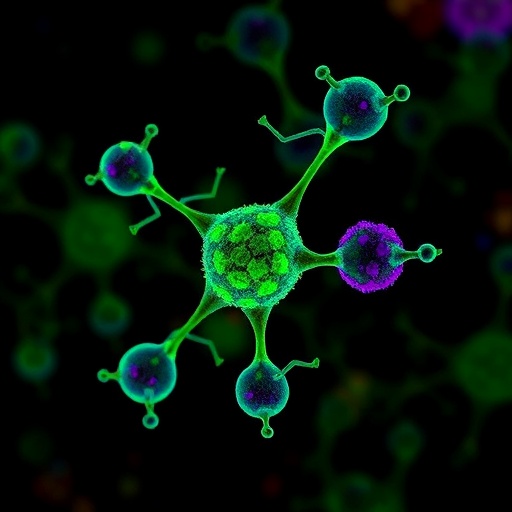Recent research conducted by a team of scientists has made significant strides in the field of cancer therapeutics through the synthesis and evaluation of novel compounds derived from oleanolic acid. The research, led by J. Cai and colleagues, focuses on the acylhydrazone derivatives of oleanolic acid, a natural compound known for its range of biological activities, including its potential anticancer properties. As cancer continues to be one of the leading causes of mortality worldwide, this innovative approach may pave the way for the development of effective treatment options that harness the power of nature to combat this complex disease.
Oleanolic acid is primarily found in various plant species and has been studied extensively for its numerous health benefits, including anti-inflammatory, hepatoprotective, and anticancer activities. Its chemical structure allows it to interact with several biological pathways, making it a versatile candidate for drug development. The current study aims to modify oleanolic acid by synthesizing acylhydrazone derivatives, expecting these modifications to enhance its therapeutic efficacy against cancer cells.
The synthetic process employed by the researchers involved the condensation of oleanolic acid with a range of acylhydrazones, leading to the creation of a library of derivatives. Each compound synthesized was subjected to rigorous testing to ascertain its biological activity, especially its antitumor properties against various cancer cell lines. The objective was to identify compounds that exhibit potent activity, providing insight into their potential as lead candidates for new cancer therapies.
In the evaluation phase, the compounds were subjected to cytotoxicity assays, wherein their ability to inhibit cancer cell growth was assessed. The researchers utilized several cancer cell lines, including those representing breast, lung, and cervical cancers, allowing for a comprehensive understanding of the derivatives’ efficacy. They found that several of the synthesized acylhydrazone derivatives exhibited remarkable growth inhibition, highlighting their potential as a foundation for future therapeutic development.
Moreover, the researchers investigated the underlying mechanisms by which these compounds exert antitumor effects. Initial findings suggest that some derivatives may induce apoptosis, or programmed cell death, in cancer cells. This process is a critical pathway in reducing tumor growth and is often manipulated in cancer therapies to achieve desired outcomes. Understanding how these derivatives interact with cancer cell signaling pathways will be key in optimizing their effectiveness while minimizing side effects.
In addition to apoptosis induction, the study also explored whether these compounds could inhibit tumor migration and invasion. The ability of cancer cells to metastasize is a major challenge in treatment, as metastatic cancer is often more difficult to manage and treat. Preliminary results indicate that certain acylhydrazone derivatives not only hinder cell proliferation but may also diminish the migratory capabilities of cancer cells, potentially leading to better outcomes in treating advanced-stage cancers.
As the research team delves deeper into the biological effects of oleanolic acid acylhydrazone derivatives, they are also examining the possibility of combining these compounds with existing cancer therapies. Synergistic effects observed between these new derivatives and traditional chemotherapeutic agents could enhance treatment efficacy, allowing for lower doses and reduced side effects. By integrating new compounds into established treatment protocols, the researchers aim to offer patients a multi-faceted approach to cancer treatment.
The promise of oleanolic acid derivatives is not restricted to their anticancer properties; they may also have potential applications in treating other diseases and conditions. Researchers note that the biological activities of oleanolic acid and its derivatives extend beyond cancer, making them valuable candidates for a wide array of therapeutic interventions. There is growing interest in exploring their roles in anti-inflammatory and neuroprotective therapies, extending the research avenues for these innovative compounds.
Despite the encouraging results, the team emphasizes that the journey from laboratory findings to clinical application is fraught with challenges. Extensive preclinical studies must be conducted to evaluate the safety and efficacy of these derivatives in vivo before moving to human trials. The approval process for new cancer therapies is rigorous, requiring comprehensive evidence that supports their use in clinical settings.
The researchers remain optimistic about their findings, collaborating with clinicians and industry partners to facilitate the transition from bench to bedside. Such collaborations are essential for translating preclinical research into viable treatment options for patients. The hope is that the unique properties of these acylhydrazone derivatives can enrich the pharmaceutical arsenal against cancer, ultimately improving patient survival outcomes.
As this groundbreaking research progresses, it has ignited interest in exploring the vast chemical diversity found in nature. Organic synthesis of plant-derived compounds holds the key to unlocking new therapeutic possibilities. The innovative strategies employed in this study may inspire future research endeavors aimed at developing new pharmacological agents from natural sources.
In summary, the synthesis and antitumor evaluation of oleanolic acid acylhydrazone derivatives represent a significant step forward in cancer research. By leveraging the natural properties of oleanolic acid and enhancing them through chemical modification, the researchers have opened up new avenues for potential cancer therapies. As they continue to explore the mechanisms and applications of these compounds, the prospect of developing effective, nature-inspired medicines offers hope in the ongoing battle against cancer.
Subject of Research: Synthesis and antitumor evaluation of oleanolic acid acylhydrazone derivatives.
Article Title: Synthesis and antitumor evaluation of oleanolic acid acylhydrazone derivatives.
Article References:
Cai, J., Pan, BW., Zheng, LL. et al. Synthesis and antitumor evaluation of oleanolic acid acylhydrazone derivatives.
Mol Divers (2025). https://doi.org/10.1007/s11030-025-11389-y
Image Credits: AI Generated
DOI:
Keywords: Oleanolic acid, acylhydrazone derivatives, antitumor evaluation, cancer therapy, apoptosis, metastasis, natural compounds.




